Text
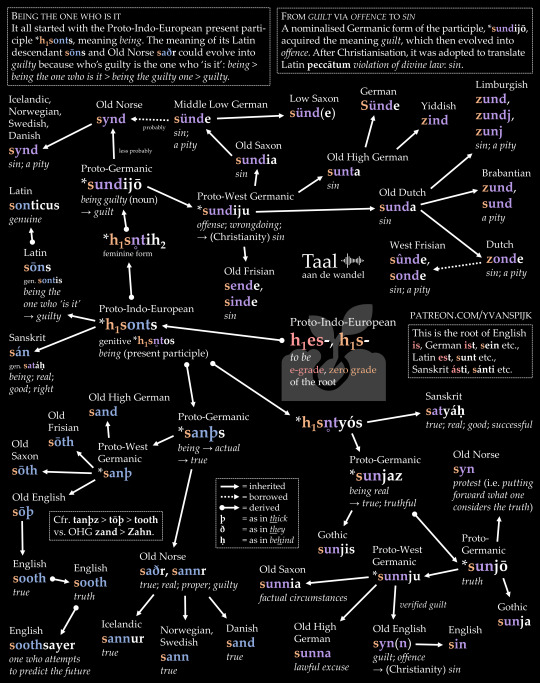
Sin, sooth, Sünde
Sin is distantly related to sooth. They stem from two different derivatives of a present participle meaning 'being'. German Sünde, Dutch zonde, and Scandinavian synd (all meaning 'sin') come from another derivative of this participle. Click the infographic to learn how it went.
#historical linguistics#linguistics#language#etymology#english#latin#dutch#german#old high german#old english#old dutch#old saxon#middle low german#low saxon#old frisian#west frisian#old norse#icelandic#danish#norwegian#swedish#gothic#proto-germanic#proto-west germanic#proto-indo-european
24 notes
·
View notes
Text
The f of enough
The word enough has the same origin as German genug and Dutch genoeg. However, unlike these words, enough doesn't start with a g-. Moreover, contrary to what its spelling suggests, it ends with an /f/ sound. When did these changes happen? Click the video to listen to a reconstruction of how this word evolved over the past 2300 years.
Enow
Modern English enough comes from the Old English variant ġenōh, with an unvoiced /x/ at the end. The variant ġenōg, with the voiced fricative /ɣ/, also continued to evolve but it followed a different path. Its final /ɣ/became /w/ in Middle English, producing inow. This was a regular sound change. Compare Old English būgan, which became bowen, now to bow. Dutch buigen and German biegen preserved their g's.
Inow ultimately became Modern English enow, which rhymes with how. It's become archaic, but when it was a living part of English, it was often used before plural nouns: enow people.
Notes
In Middle and Early Modern English, different dialects underwent different sound changes, and some sociolects were more conservative than others, preserving certain stages for a longer time. Variants shown and not shown in my chronology coexisted. This chronology, which represents the evolution in the London region, is only one of the paths this word took.
I thank fellow historical linguist Alex Foreman (A.Z. Foreman on X, YouTube and Patreon) for his advice on reconstructing the changes in the Late Middle English period.
#historical linguistics#linguistics#language#etymology#english#old english#middle english#early modern english#video#audio#lingblr#proto-germanic#proto-west germanic
50 notes
·
View notes
Text
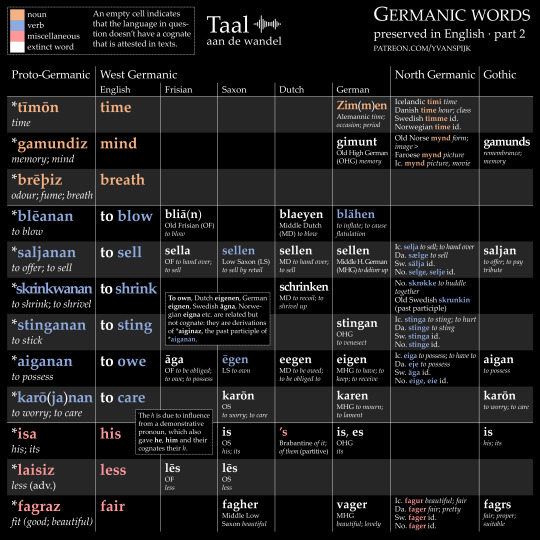
Words preserved in English - part 2
Time, less, care, his - these very common words have lost almost all of their cognates in the other Germanic languages. English is infamous for having lost much of its Germanic vocabulary, but there are quite a few words that survive in English as one of the very few Germanic languages. Here are twelve more examples, including some nouns and a pronoun.
This is part two of a series. Click here for part one.
#historical linguistics#linguistics#language#etymology#english#dutch#german#old dutch#middle dutch#old high german#middle high german#old saxon#middle low german#low saxon#old frisian#frisian#icelandic#danish#norwegian#swedish#gothic#old norse#proto-germanic#lingblr
61 notes
·
View notes
Text
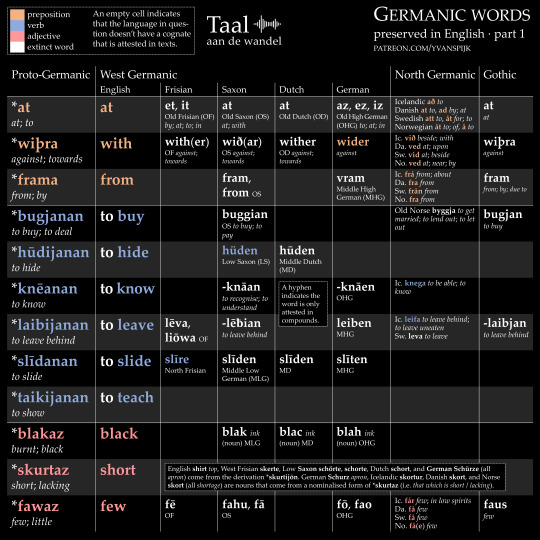
Words preserved in English - part 1
English has a bad name when it comes to preserving words of Germanic origin. In the centuries after the Norman Conquest, a lot of native English words, inherited from Proto-Germanic, were supplanted by French and Latin words. However, what's less well known is that English also preserves quite a few Germanic words that were lost in the other West Germanic languages, such as Dutch, German, Low Saxon, and Frisian. The infographic shows twelve examples. My next infographic will contain nouns and more verbs.
#historical linguistics#linguistics#language#etymology#english#dutch#german#old dutch#middle dutch#old high german#middle high german#old saxon#middle low german#low saxon#old frisian#frisian#icelandic#danish#norwegian#swedish#gothic#old norse#proto-germanic#lingblr
62 notes
·
View notes
Text
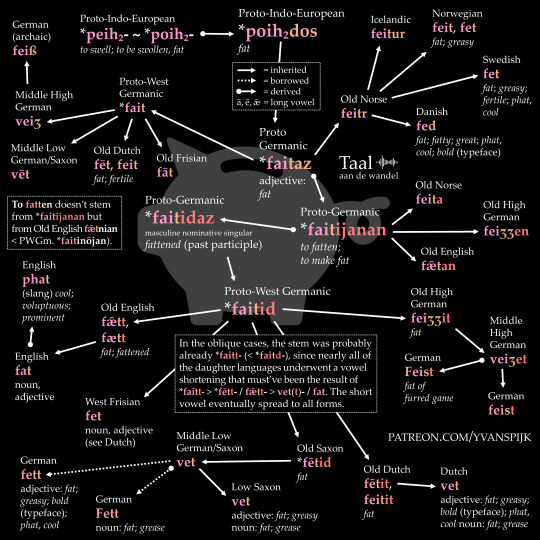
The history of fat
The word fat comes from Old English fǣtt. This adjective was originally a past participle meaning 'fattened; made fat'. The corresponding verb was fǣtan (to fatten; to make fat). If it had survived, it would probably have become to *feat (not related to the noun feat, which comes from Old French fait 'fact; deed').
Dutch vet, German feist and fett (a borrowing from Saxon) and West Frisian fet have the same history as fossilised past participles. The North Germanic words meaning fat, such as Swedish fet and Icelandic feitur, are closely related, but they don't come from a past participle. Instead, they stem from an adjective that in West Germanic only marginally survived as German feiß (and dialectal forms). The English cognate would've been *foat.
#historical linguistics#linguistics#language#etymology#english#dutch#german#old norse#danish#norwegian#swedish#icelandic#old high german#middle high german#old english#frisian#middle low german#old saxon#low saxon#old dutch#old frisian#proto-indo-european#proto-germanic#proto-west germanic#lingblr
52 notes
·
View notes
Text
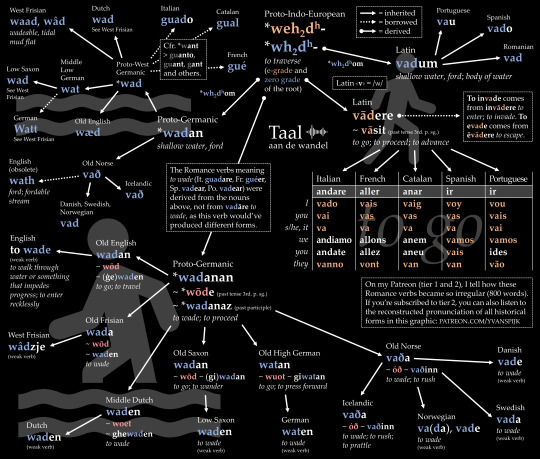
To wade & vadere
The English verb to wade is closely related to Romance verbs forms such as Italian vado (I go), French va (goes) and Spanish vamos (we go). These come from the Latin verb vādere (to go). Most forms of this verb don't survive in the Romance languages, but some of its present tense forms were lent to the mixed bags of the Romance verbs for 'to go'. Click the infographic to learn more about the origins of to wade and its Romance cognates.
On my Patreon you can read why the Romance verbs for 'to go' became so irregular and why the Germanic verbs became regular weak verbs instead (800 words). Patrons who are subscribed to tier 2 can also download an audio file of me reading the historical words in their reconstructed pronunciations.
#historical linguistics#linguistics#language#etymology#english#latin#french#dutch#german#spanish#romanian#catalan#proto-germanic#proto-west germanic#old norse#old high german#old saxon#low saxon#middle dutch#frisian#old frisian#old english#danish#icelandic#swedish#norwegian#portuguese#italian
75 notes
·
View notes
Text
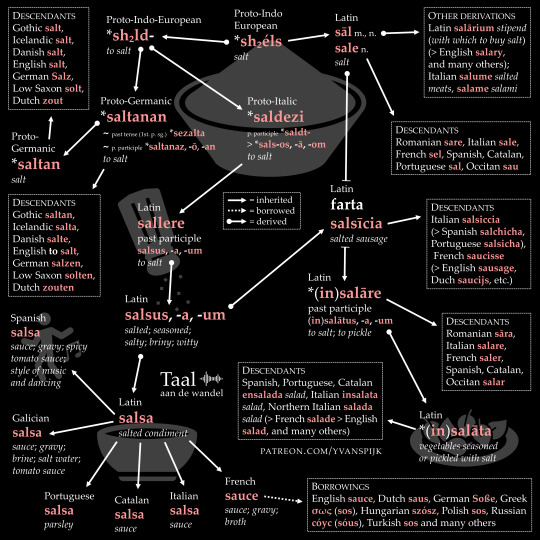
Sauce, salsa & co.
Sauce and salsa have the same origin: they both stem from Latin salsa (salted condiment), via French and Spanish. Their root is found in Latin sāl/sale (salt), from which many words derive, such as sausage, salad, salami, and salary.
English salt, a native Germanic word stemming from Proto-Germanic, is distantly related to the Latin and Romance words. Click the infographic to learn more.
#historical linguistics#linguistics#language#etymology#english#latin#french#dutch#german#spanish#lingblr#occitan#catalan#galician#portuguese#romanian#gothic#icelandic#danish#low saxon#proto-italic#proto-germanic#proto-indo-european
104 notes
·
View notes
Text
Frigg's day
Friday comes from Old English Frīġedæġ, literally 'day of Frīġ', the Germanic goddess of love. Frīġedæġ stemmed from West Germanic *Frījā dag, a loan translation of Latin Veneris diēs (which became venerdì in Italian, vendredi in French, and viernes in Spanish). The West Germanic peoples equated the Roman goddess Venus with their *Frīju. Listen to how the day name evolved.
Frigg and Freyja
The Old Norse counterpart of *Frīju was Frigg. Both names stem from Proto-Germanic *Frijjō, a derivation of the adjective *frijaz ('beloved; free'), the ancestor of free. The word friend is also related: it comes from *frijōndz ('loving one').
*Frijjō became Frigg in Old Norse because of a sound change that turned /jj/ (a long y sound, as in hay-yield) into /gg/ (as in egg group). Compare *ajjan > egg, which was borrowed into English and supplanted native ey.
The names *Frīju and Frigg are often confused with Old Norse Freyja, but these words aren't etymologically related in any way. Freyja stems from Proto-Germanic *frawjōn ('lady'), a word that became Frau in German, vrouw in Dutch, and frou in Frisian. In the Middle Ages, these West Germanic words still meant 'lady' but they've now become the default word for 'woman'.
While their names aren’t related, it’s unknown whether Frigg and Freyja originally referred to the same goddess, Freyja possibly being a title of Frigg: 'the Lady'. Dr. Jackson Crawford explains the question very well in one of his videos: https://youtu.be/5eN3wNgPARM?
Cognates
*Frījā dag became frīatag in Old High German and Freitag in the modern language. Middle Dutch had both vriëndach (with a secondary genitive ending -en) and vridach, which became vrijdag. Old Frisian had multiple forms: frīadei, frīdei, and frēde, the latter being the ancestor of modern freed.
The West Germanic name *Frījā dag was borrowed and calqued into Old Norse. A borrowed form is frjádagr, whence the modern forms, such as Swedish fredag and Icelandic frjádagur.The form friggjardagr, with the native genitive of Frigg, is a calque: a loan translation. There was even freyjudagr, which is interesting in the light of the identity of Frigg and Freyja.
Do you like short articles like this? More than half of my posts on Patreon include such an article. Subscribe to tier 1 ($2 a month) or tier 2 ($5) to read the articles that go with my past and future infographics.
#historical linguistics#linguistics#language#etymology#english#video#audio#proto-germanic#proto-west germanic#old english#middle english#early modern english#lingblr
53 notes
·
View notes
Text
Thunder's day
Thursday comes from Old English Þunresdæġ, literally 'Thor's day'. While the modern god name Thor was borrowed from Old Norse Þórr, the part Thurs- in Thursday directly descends from the genitive case of the Old English counterpart Þunor.
The name of the god Þunor was nothing more than the noun meaning 'thunder', and the word thunder is its direct descendant. If Thursday hadn't undergone its vowel and consonant reductions, it would've been Thundersday.
Click the video to listen to how the day name evolved. The Middle English to Early Modern English stages are based on the dialect of the region of London.
Cognates
Germanic *þunaras dag was a loan-translation of Latin Jovis diēs, i.e. 'Jupiter's day'. The Germanic peoples equated the Roman god of thunder with Thor despite their status difference. Jovis diēs became French jeudi, Italian giovedì, Spanish jueves and many others.
Thursday is cognate to Dutch donderdag, from Middle Dutch donre(s)dach. While Thursday lost its connection to the word thunder, Dutch donderdag can literally be interpreted as thunder-day. The same goes for German Donnerstag, from Old High German donarestag, where the genitive case of Donner can still be discerned.West Frisian has tongersdei, containing tonger.
North Germanic words such as Danish torsdag come from Old Norse þórsdagr, which was formed after the example of West Germanic *Þunaras dag.
#historical linguistics#linguistics#language#etymology#english#video#audio#proto-germanic#proto-west germanic#old english#middle english#early modern english#lingblr
50 notes
·
View notes
Text
Tiw's day
Tuesday comes from Old English Tīwesdæġ, literally 'Tīw's day'. Tīw was the name of the Germanic god that's also known by his Old Norse name Týr. Both names stem from Proto-Germanic *Tīwaz. Click the video to listen to how the day name evolved from Proto-West Germanic via the dialects of the London region to modern British English.
Cognates and false cognates
English Tuesday is cognate to West Frisian tiisdei. It is, however, not related to Dutch dinsdag, Low Saxon dings(el)dag, and German Dienstag. These names stem from West Germanic *þingas dag instead, literally 'day of the thing', which was the day of the popular assembly, the *þing.
Old High German had Zīestag, from *Tīwas dag, which became Ziestag but was replaced by Dienstag in the standard language. Regional Alemannic languages in Switzerland and Austria have preserved forms such as Ziischtig and Zischtig.
The Modern Dutch equivalent of Tuesday would've been *Tuwsdag if it hadn't disappeared. It is not attested in any historical form of Dutch.
#historical linguistics#linguistics#language#etymology#english#video#audio#proto-germanic#proto-west germanic#old english#middle english#early modern english#lingblr
57 notes
·
View notes
Text
Woden's day
In Standard English, Wednesday is pronounced without a /d/. Then why's it written with a d? That's because it was originally pronounced with a /d/. The word comes from a West Germanic name meaning 'Woden's day', Woden being the god that's nowadays most often called Odin. D-less forms such as Wennesdai are attested from the 14th century. Click the video to hear how the word evolved between the second century AD and now.
The Middle English to Early Modern English stages are based on the dialect of the region of London.
On my Patreon (tier 1) I tell everything about the the variation between the o and e forms in Old English and Middle English.
#historical linguistics#linguistics#language#etymology#english#video#audio#proto-germanic#proto-west germanic#old english#middle english#early modern english
83 notes
·
View notes
Text
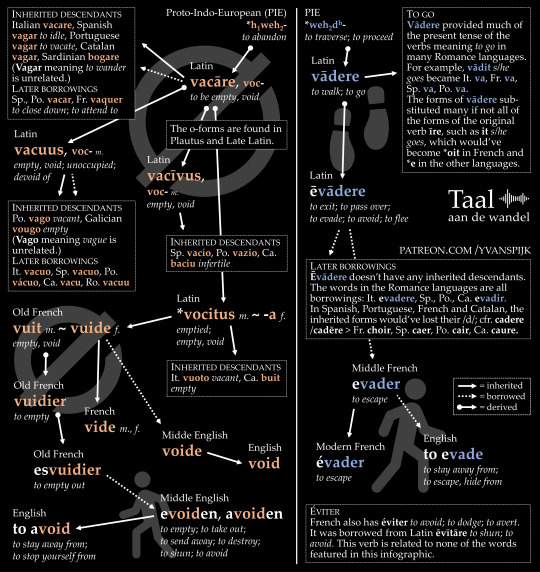
Avoid & evade
To avoid and to evade are quite similar, both in form and meaning. However, they stem from different words that have no etymological relationship at all. Avoid is related to void, which itself is distantly related to Italian vuoto (empty), while evade is distantly related to Italian vado (I go).
#historical linguistics#linguistics#language#etymology#english#latin#french#old french#middle french#middle english
68 notes
·
View notes
Text
Follow me on Facebook!
You can now also follow me on Facebook:
facebook.com/taalaandewandel
Every future infographic and video will be posted there as well. 😃
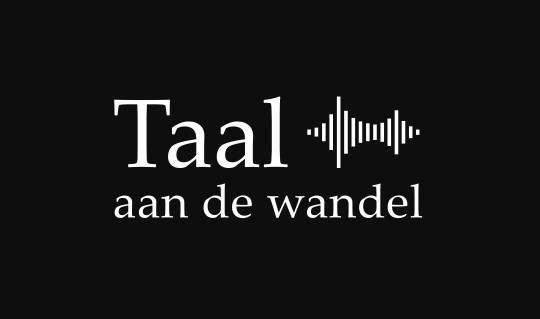
4 notes
·
View notes
Text
The f of laugh
Why is laugh written with -ugh while it ends with an [f] sound? It's because the spelling laugh reflects how the word was pronounced in Late Middle English, some 500 years ago. Click the video to listen to a phonetic reconstruction of how this verb evolved from 3rd-century BC Proto-Germanic to modern-day Standard English. The Middle English to Early Modern English stages are based on the dialect of the region of London.
#historical linguistics#linguistics#language#etymology#english#proto-germanic#proto-west germanic#old english#middle english#early new english#video#audio#lingblr
80 notes
·
View notes
Text

The word bairn (child), which is used in Scots, Northern and Scottish English, is closely related to born and to the verb to bear. These words all come from a root meaning 'to carry'. When a baby is born it's been carried to term. The infant is then carried around. Click the infographic for more.
#historical linguistics#linguistics#language#etymology#english#german#dutch#scots#old english#old norse#danish#swedish#norwegian#lingblr#icelandic#proto-germanic#gothic#old high german#old saxon#low saxon#old frisian#frisian#old dutch#middle dutch#proto-indo-european
75 notes
·
View notes
Text

Duke, -duce, Herzog & ziehen
Duke comes from the Latin word dux (leader). It's related to the verb dūcere (to lead; pull), whence English -duce, for example in to seduce (whose original Latin meaning was 'to lead astray').
The second part of German Herzog (duke) is cognate to dux. This part, -zog, is related to the German verb ziehen (to pull), cognate of dūcere.
Old English had cognates of both words. Its counterpart of Herzog was heretoga (army leader). In Middle English it became heretowe, which would've become modern *hartow. The Old English cognate of ziehen was tēon. This verb would've become *to tee if it had continued to exist. See the infographic for information about its past tense and past participle.
#historical linguistics#linguistics#language#etymology#english#latin#french#dutch#german#spanish#old english#old french#old dutch#old saxon#low saxon#old high german#old frisian#frisian#romanian#catalan#portuguese#greek#venetian#gothic#lingblr
60 notes
·
View notes
Text
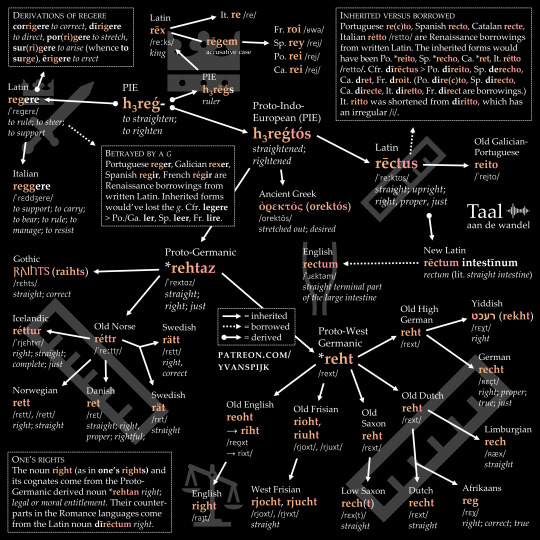
The words right and rectum have a common origin. Right comes from Proto-Germanic *rehtaz ('straight; right; just'). This word shared a common Proto-Indo-European ancestor with Latin rēctus ('straight; right; just'), from which the medical term rectum ('straight terminal part of the large intestine') was derived. The infographic shows more.
#historical linguistics#linguistics#language#etymology#english#dutch#german#low saxon#frisian#old frisian#old saxon#old high german#old english#old dutch#lingblr#proto-germanic#proto-west germanic#yiddish#limburgian#faroese#icelandic#norwegian#swedish#danish#latin#french#spanish#old spanish#old french#old galician-portuguese
58 notes
·
View notes